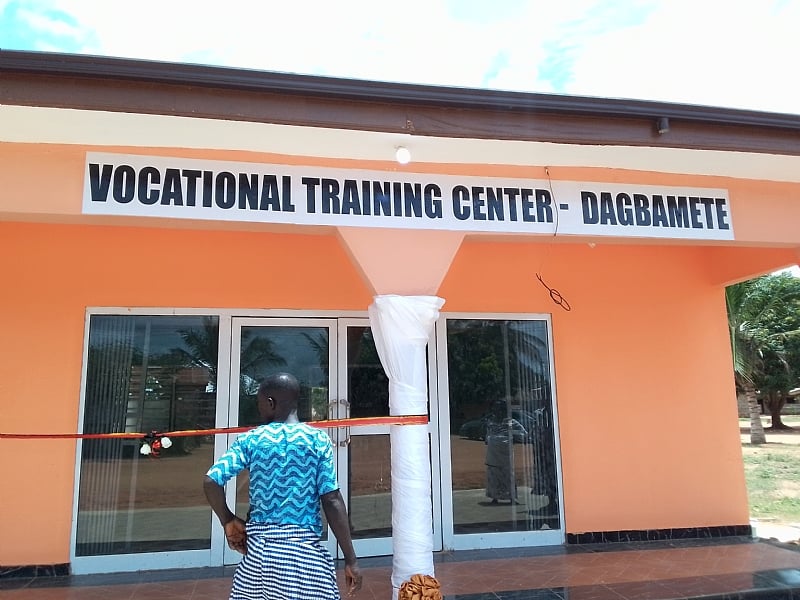The small community of Dagbamete in Ghana’s Volta Region has taken a significant stride towards self-reliance and youth empowerment with the inauguration of a two-block vocational training centre. Funded entirely by the community’s own resources, the centre, opened on April 20, 2025, during the annual Apetorku Gbodzi festival, represents a beacon of hope for young people seeking practical skills and a pathway to economic independence. The centre, which currently accommodates 100 apprentices, is poised to expand its capacity to 400, offering a diverse range of vocational training programs. This initiative addresses a critical need for skills development, especially for youth who may not have access to traditional higher education, empowering them to become self-sufficient and contributing members of their community. The community’s vision extends beyond merely providing training; it encompasses a holistic approach to youth development, incorporating elements of cultural preservation, leadership training, and community upliftment.
The Apetorku Gbodzi festival, a traditional celebration of the Hunuawo people, served as the backdrop for this momentous occasion. The festival, themed “Harnessing Traditional Resources for Modernisation, Youth Development, and Leadership,” underscores the community’s commitment to blending traditional values with modern aspirations. The event not only celebrated the opening of the vocational training centre but also highlighted the community’s proactive approach to development and their desire to partner with the government to address long-standing infrastructure deficits. The community’s plea for government support resonates with their belief that collaboration is key to achieving sustainable development. This appeal reflects a broader sentiment of self-reliance coupled with a pragmatic understanding of the role government can play in facilitating progress.
Sammy Davor, secretary to the Torgbi Apetorku Shrine, articulated the community’s vision during his welcome address. He emphasized the festival’s significance as a time for spiritual, emotional, and psychological renewal, connecting the community’s cultural heritage to its aspirations for the future. Davor also seized the opportunity to bring to the forefront critical infrastructure needs, specifically calling upon President John Mahama to address the incomplete Akatsi–Dagbamete–Avenorpeme road project, initially commissioned in 2016 but subsequently abandoned. This appeal underscores the community’s frustration with stalled projects that hinder development and limit access to essential services.
The dilapidated state of the Dagbamete Junior High School, another pressing concern, was also brought to the government’s attention. The school block, left unroofed for 15 years after the initial contractor abandoned the project, suffered further damage from a recent rainstorm, exacerbating the already challenging learning environment for the community’s children. Davor’s appeal highlighted the urgent need for intervention to ensure a safe and conducive learning space for the community’s youth. This plea for government support reflects the community’s unwavering commitment to education as a cornerstone of development.
Recognizing the need for accommodation for apprentices from neighboring communities, a sod-cutting ceremony for a 128-room hostel was also conducted during the festival. This proactive step demonstrates Dagbamete’s commitment to ensuring accessibility to its vocational training program. The hostel, anticipated to house approximately 200 apprentices, will further contribute to the centre’s capacity to serve a wider population and foster regional skill development. This infrastructural addition signifies the community’s foresight and dedication to maximizing the impact of their vocational training initiative.
Torgbui Agudzeamegah II, the Chief of Dagbamete, reiterated the community’s appeal for government partnership in expanding the vocational training centre. Foreseeing an influx of young people from other regions seeking skills training, he emphasized the need for additional classrooms and accommodation facilities. This proactive approach highlights the community’s recognition of the potential of its vocational training program to become a regional hub for skills development. The Chief’s call for collaboration underlines the understanding that government support is crucial to realizing the full potential of this initiative.
While acknowledging the government’s support in staffing the community’s health centre—a facility initially built and equipped by the community itself—Torgbui Agudzeamegah also expressed concern about the limited government investment in other crucial areas of Dagbamete’s development. He underscored the community’s self-reliance, highlighting their independent efforts in building and maintaining essential infrastructure, including schools, sanitation facilities, an electric kitchen, street lighting, and the aforementioned health centre. This self-sufficiency, while commendable, also points to a disparity in government support compared to other communities.
The Chief’s statement, “There isn’t anything I can point to as a direct government project—we build, equip, and maintain everything ourselves,” encapsulates the community’s spirit of self-reliance while also subtly conveying a desire for greater government involvement. This sentiment reveals the inherent tension between a community’s proactive approach to development and the need for external support to ensure sustainable progress. Dagbamete’s story serves as a potent example of a community taking ownership of its future while advocating for a more equitable distribution of resources and government support. Their journey reflects the aspirations of many rural communities striving for progress and highlighting the crucial role of both community initiative and government partnership in achieving sustainable development.


